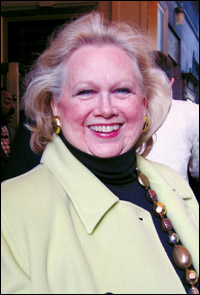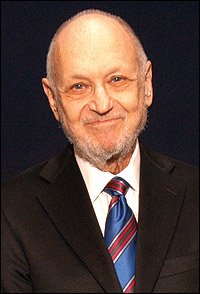
*
The 1927-28 season was a great one for Broadway in more ways than one. Not only did it see the most productions ever in Broadway history, it also saw the birth of giant talents who continue to brighten our stages. The Tony Awards wishes a "Happy 80th Birthday" to these theatrical titans.
EDWARD ALBEE
Playwright Edward Albee exploded in the New York theatre world with a series of Off-Broadway one act plays including The Zoo Story (1958) and The American Dream (1959). He changed the landscape of Broadway in 1962 with Who's Afraid of Virginia Woolf?, for which he won his first Tony Award. This was followed by The Ballad of the Sad Café (1963), Tiny Alice (1964), A Delicate Balance (1966, Pulitzer), All Over (1971), and Seascape (1975, Pulitzer). Albee then entered a relatively fallow period on Broadway, with The Lady from Dubuque (1980), Lolita (1981), and The Man Who Had Three Arms (1983) which had brief runs. A 1996 revival of A Delicate Balance ushered in a second period of universal acclaim, with the Off-Broadway plays Three Tall Women (1994, Pulitzer) and The Play About the Baby (2000) leading to a triumphant Broadway return with The Goat, or Who Is Sylvia? (2002, Tony Award). Albee has celebrated his 80th birthday with a full agenda of productions Off-Broadway and regionally — some directed by himself — including Peter and Jerry (2007), Me, Myself & I (2007) and Occupant (2008).
HAROLD PRINCE Harold Prince holds more Tony Awards than any other individual — 21. In a career that has lasted more than half a century, Prince directed the premiere productions of She Loves Me, Cabaret, Company, Follies, Candide, Pacific Overtures, A Little Night Music, Sweeney Todd, Evita, The Phantom of the Opera and Parade. Among the plays he has directed are Hollywood Arms, The Visit, The Great God Brown, End of the World, Play Memory and his own play, Grandchild of Kings. Prince also directed Bounce, which was seen at the Goodman Theatre in Chicago and the Kennedy Center in Washington, DC. Before becoming a director, Prince produced the Broadway premieres of The Pajama Game, Damn Yankees, West Side Story, Fiddler on the Roof, Fiorello! and A Funny Thing Happened on the Way to the Forum. He is the recipient of a National Medal of Arts for a career spanning more than 40 years in which "he changed the nature of the American musical." He was a 1994 Kennedy Center Honoree. His most recent Broadway project was LoveMusik in 2007, and this spring he and co-director Susan Stroman supervised the New York reading of a new musical Paradise Found. He earned a special Tony Award for Lifetime Achievement in 2006.
NEIL SIMON
Neil Simon has written more than 30 plays, including five musicals, and helped rewrite (without billing) many more, earning him the nickname "Doc," as in play doctor. He and his brother Danny teamed to write sketches for Phil Silvers, Sid Caesar, Jerry Lewis and other major stars of the 1950s. But it was in the 1960s, when he became a solo playwright for Broadway, that he earned his greatest acclaim and success, sometimes having three shows — generally expertly constructed comedies — running simultaneously. The list of his hits includes Come Blow Your Horn; Little Me; Barefoot in the Park; The Odd Couple; Sweet Charity; The Star-Spangled Girl; Plaza Suite; Promises, Promises; Last of the Red Hot Lovers; The Gingerbread Lady; Prisoner of Second Avenue; The Sunshine Boys; The Good Doctor; God's Favorite; California Suite; Chapter Two; They're Playing Our Song; I Ought to Be in Pictures; Fools; Brighton Beach Memoirs; The Goodbye Girl; Biloxi Blues; Broadway Bound; Jake's Women; Rumors; Lost in Yonkers; Laughter on the 23rd Floor; London Suite and Proposals. He won the Tony Award for Best Play twice: in 1985 for Biloxi Blues and in 1991 for Lost in Yonkers, the latter of which also won the Pulitzer Prize for Drama.
 |
||
| Barbara Cook |
||
| photo by Aubrey Reuben |
 |
||
| Charles Strouse |
TOM JONES
Lyricist Tom Jones grew up in the small town of Littlefield, Texas. While at the University of Texas in Austin in 1948, he wrote a college show with another small-town Texan, Harvey Schmidt. After some nightclub work, they wrote an Off-Broadway musical that turned out to be the record-breaking The Fantasticks (1960). Their "Try to Remember" musical ran through 2002, earning Jones a Tony Honor in 1992. Producer David Merrick brought Jones and Schmidt to Broadway for two musicals, 110 in the Shade (1963) and I Do! I Do! (1966), the latter starring Mary Martin and Robert Preston. The experimental Celebration (1969) proved to be their last new Broadway show, but they continued to write a string of effective and evocative musicals including Philemon (1975), Colette (1982), Grover's Corners (1987), Colette Collage (1991), Mirette (1998) and Roadside (2001). Since Schmidt's retirement, Jones has written a musical version of Harold and Maude (2004) as well as directing and appearing in the 2006 revival of The Fantasticks.
MARIAN SELDES
Marian Seldes has been working on Broadway since 1947, when she made her debut opposite Dame Judith Anderson in Medea. Since then, she's become known as a playwright's actress, originating roles in plays by Tennessee Williams, Edward Albee and Terrence McNally. Among her two dozen Broadway appearances, she was a member of the original Broadway casts of Equus, Deathtrap, The Chalk Garden and A Delicate Balance, the last of which earned her the Tony Award, one of five times she was nominated for that honor. Voted into the Theatre Hall of Fame, she last year completed a Broadway run opposite Angela Lansbury in the tennis drama, Deuce. She remained busy this past spring doing readings of works by Eudora Welty and Christopher Durang.
JERRY BOCK
Composer Jerry Bock is best known for his fertile, decade-long collaboration with lyricist Sheldon Harnick that produced two Tony-winning Best Musicals; one of them, Fiorello! won the Pultizer Prize, the other, Fiddler on the Roof, became for a time, the longest running musical in Broadway history. Bock made his Broadway debut in 1955 with the short-lived Catch a Star, with lyrics by Larry Holofcener, who also wrote lyrics for his next show (and first hit) the Sammy Davis musical Mr. Wonderful. Bock was chosen as one of the composers for the planned The Ziegfeld Follies of 1957, but it closed out of town. Soon afterward, Bock partnered with lyricist Sheldon Harnick. They would work together for just a dozen years but in that time they produced some of the most polished musicals of the 1960s. Their freshman effort, The Body Beautiful, set in the world of prize fighting, ran only 60 performances in 1958. However, producer Hal Prince liked what he heard and signed Bock and Harnick to compose Fiorello!, the 1959 musical biography of former New York City Mayor Fiorello H. LaGuardia. Fiorello! tied for the Best Musical Tony Award that year with The Sound of Music. For their third show, Bock and Harnick picked a third New York subject: a reformer who takes on Manhattan's notorious turn of the century red light district, known as the Tenderloin, which gave the show its title. Their next project, She Loves Me, told the story of two salespeople at a Budapest perfume shop whose longtime bitter feud comes to an end when they discover they are each other's anonymous pen pals. Bock and Harnick entered Broadway immortality with their next show, Fiddler on the Roof, based on Sholom Aleichem's stories of a Jewish milkman in Tsarist Russia. Bock and Harnick got Biblical with their next show, The Apple Tree, structured as three one-act musicals about male-female relations throughout history. For their next project, they jumped to Germany and to the upper end of the economic ladder with The Rothschilds, the story of the rise of that mega-wealthy clan. Bock and Harnick went their separate ways after The Rothschilds, but did reunite to write a new song for the 2004 Broadway revival of Fiddler on the Roof, "Topsy Turvy." Bock has left one more legacy. In 1997 he established the Jerry Bock Award for Excellence in Musical Theatre, an annual grant presented to the composer and lyricist of a project developed in the BMI Lehman Engel Musical Theater Workshop.
(Robert Viagas contributed to this story, which appears in the Playbill of the 2008 Tony Awards at Radio City Music Hall.)










Jeremy-Daniel.jpeg)
